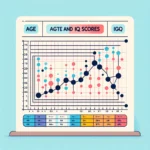Understanding the Relationship Between Age and IQ Scores: Insights for Cognitive Development
The link between age and intelligence quotient (IQ) scores is an intriguing topic that has captivated psychologists, researchers, and the general public alike. As the human brain develops and matures, it’s natural to question how these physiological changes affect one’s cognitive abilities and how they are reflected in IQ scores. While the correlation between age and IQ is complex, various studies have shed light on how intelligence can evolve across the lifespan. This article aims to delve into the scientific understanding of how age impacts IQ scores and the implications for cognitive development.
The Developmental Trajectory of IQ in Children and Adolescents
Childhood and adolescence are periods of rapid brain development, marked by significant cognitive growth. During these years, IQ scores tend to increase as children absorb new information, learn problem-solving techniques, and refine their reasoning abilities. Environmental factors such as education, socio-economic status, and parental support play pivotal roles in influencing a child’s developing intelligence.
The Role of Educational Interventions
Educational interventions during early childhood can have a remarkable impact on IQ scores. Access to quality education, engaging in intellectually stimulating activities, and exposure to a language-rich environment can help maximize a child’s cognitive potential. Such nurturing conditions can lead to improvements in IQ scores as children grow, highlighting the importance of early childhood development programs and educational opportunities.
The Peak of Cognitive Abilities
Research suggests that cognitive abilities peak at different ages for varying types of intelligence. Fluid intelligence, which involves the capacity to think logically and solve new problems, typically peaks in young adulthood before gradually declining. In contrast, crystallized intelligence, which relates to the accumulation of knowledge and skills over time, often continues to grow and may peak during middle age. These nuances illustrate that the age-IQ relationship is not linear, and different cognitive domains may follow distinct trajectories.
The Ageing Brain and Cognitive Decline
As individuals enter older adulthood, the question of age-related cognitive decline comes to the forefront. Several longitudinal studies have indicated a general decrease in IQ scores with advancing age. This decline is often associated with natural neurological changes, such as decreased processing speed, memory retrieval issues, and reduced executive functioning. However, it’s important to acknowledge the considerable variability among older adults, with many maintaining high levels of cognitive functioning well into their senior years.
The Influence of Lifelong Learning
The concept of neuroplasticity suggests that the brain is capable of learning and forming new neural connections throughout life. Engaging in lifelong learning, maintaining an active social life, and participating in mentally stimulating activities can help preserve cognitive abilities and potentially influence IQ scores positively, even as we age.
The Genetic and Environmental Interplay
The interplay between genetic predispositions and environmental influences is also a critical factor in understanding how age impacts IQ scores. Genetic factors provide a blueprint for cognitive potential, while environmental factors can either foster or hinder the realization of that potential. The dynamic interaction between these elements continues to be a significant area of research in the field of intelligence and cognitive development.
Conclusion: A Multifaceted View on Age and IQ
In conclusion, the relationship between age and IQ score is multifaceted, with numerous influences shaping an individual’s cognitive capabilities over their lifespan. It’s essential to recognize that while there may be general trends in how age affects IQ, individual experiences and circumstances can lead to a wide range of cognitive outcomes. The continuous exploration into the intricacies of cognitive development underscores the importance of supporting intellectual growth at every stage of life to foster lifelong learning and cognitive well-being.

